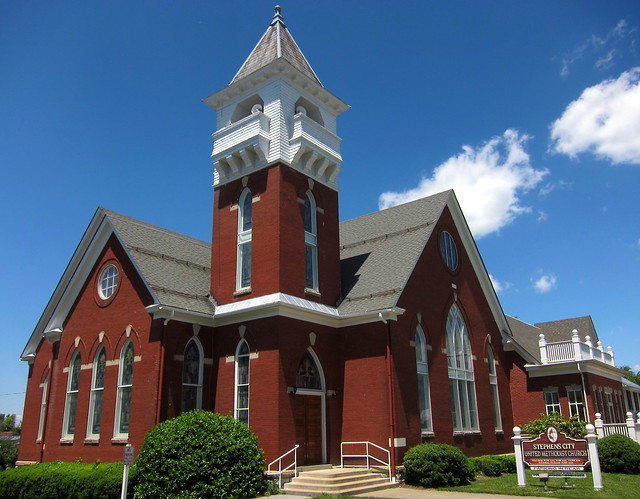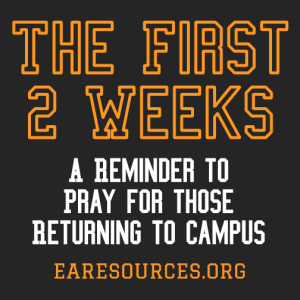
Category Archives: For Emerging Adults
Blazing New Trails within the Church
 I want to share the story of a trailblazer -she didn’t see a path for her beyond youth group, so she made one. Continue reading
I want to share the story of a trailblazer -she didn’t see a path for her beyond youth group, so she made one. Continue reading
When the Church is Fighting over Coffee Pots

© 2010 Richard Masoner / Cyclelicious, Flickr | CC-BY-SA | via Wylio
I am still shocked and amazed that it happened. I had heard stories about church conflict centered on the color of carpet or the VBS theme, but it would never happen in my church.
Never say never.
In the midst of a church business meeting, a discussion began that resulted in a fight over the use of coffee pots. Harsh words were uttered. People were angry.
In a room where the average age was well over forty
In a room that was holding the leadership of our church.
In a room where gray hair ran rampant, and where wisdom and maturity were supposed to be found in abundance.
In this room selfishness reigned and child-like behavior was obvious.
Sometimes immature behavior gets ascribed to… well, to those who are younger (or to people we don’t like or agree with). Yet at that moment, it was difficult to imagine any other age group having this same conversation.
Psalm 119: 99,100 says,
I have more insight than all my teachers, for I meditate on your statutes. I have more understanding than the elders, for I obey your precepts.
Spiritual maturity is not dependent upon age, but upon the individual’s meditation and obedience to God’s word. We all make assumptions about others based upon their age – which is defined as Ageism. Ageism is prejudice or discrimination based upon age, and I believe it to be one of the causes of the Millennial Exodus (or why young adults are leaving the church).
When judged by his age, Paul commands Timothy to stand strong against ageism, “Don’t let anyone look down upon you because you are young.” (1 Timothy 4:12) Timothy was called to lead, and Paul knew that his character and calling (rather than age) were the foundation of his leadership.
Why then are young adults often excluded from leadership because of age? (read more)
For several years in a community where I served, I regularly questioned why our leadership had to be over fifty. After nominating many young(er) adults, they were always mysteriously removed for the same reason – they were in the wrong ‘phase of life’ (aka – anyone with children in the home). It was thinly veiled ageism – excluded people due to their age.
When the coffee pots become the center of your church meetings, it reveals that something is wrong.
Your church may be equating age with maturity.
 Dr. G. David Boyd is the Founder and Managing Director of EA Resources. He is passionate about equipping parents and churches to reach Millennials. If there is some way that he can serve your community, contact him at gdavid@earesources.org.
Dr. G. David Boyd is the Founder and Managing Director of EA Resources. He is passionate about equipping parents and churches to reach Millennials. If there is some way that he can serve your community, contact him at gdavid@earesources.org.
Why You Need to Be Yourself When Marketing to Millennials
Earlier this week, I posted an article about Hilary Clinton’s tweet that offended Millennials and how the church can learn from her mistake.
Here is a new article that while focusing on marketing can reveal how churches often drive Millennials away.

Authenticity is a buzzword – especially among churches.
Yet the meaning is different for Millennials that other generations (Read more HERE).
If you are seeking Millennials, it is crucial to be true to yourself. As I reflected on how churches attempt to appeal to Millennials in inauthentic ways, here are a few questions that came to mind.
1. Do you claim to be non-denominational, and yet have clear ties and restricted beliefs for your community?
2. Do you claim diversity, and yet have none? (For example, when using “Stock” photos, do you accurately represent your community?)
3. Do you claim to be earth-friendly, and yet don’t recycle? I know of two large churches in my community who actually put out recycling containers to appear eco-friendly, and yet were unwilling to pay for recycling (and they were throwing the recyclables in the garbage).
4. Do you claim to empower women and yet don’t have any in leadership?
I do not believe that you have to change your communities policies in these areas; however, you should accurately display them.
The main point of the article is that we should truly express our community’s set of beliefs (rather than hiding – or using a “bait and switch” technique). While these beliefs may turn away some people, they will help others find a place where they belong.
 Dr. G. David Boyd is the Founder and Managing Director of EA Resources. If he can assist your community to reach Millennials, please contact him at gdavid@earesources.org.
Dr. G. David Boyd is the Founder and Managing Director of EA Resources. If he can assist your community to reach Millennials, please contact him at gdavid@earesources.org.
A College Student’s Prayer – by St. Thomas Aquinas
Creator of all things, true source of light and wisdom,
origin of all being,
graciously let a ray of your light penetrate
the darkness of my understanding. Continue reading
A Two-Minute Prayer for College Students
As part of our prayer campaign for college students (called “The First Two Weeks”) Here is something that you can use as a prayer guide.

© 2013 mer chau, Flickr | CC-BY | via Wylio
Lord, we pray for the protection of (name)
We ask that you would guard their heart and their mind in Christ Jesus
That you would wrap them up in Your love
And deliver them from all evil
Lord, we pray that you would give (name) great enthusiasm for their studies
May you inspire them each and everyday
May each seminar and class bring fresh inspiration to their work
May each moment be filled with the energy they need for their tasks
Lord, we pray that (name) would know the hope to which they are called
That their life would be transformed by revelation from Heaven
That You would inspire their direction
And gently lead them into their destiny
Lord, we especially pray for (name’s) friends at college
May they come to know Your goodness and love
To walk in Your freedom and grace
All the days of their life
Amen.
Read more: http://www.lords-prayer-words.com/prayers_before/prayers_for_students.html#ixzz3hrVQL3IA
The First 2 Weeks – A Call to Prayer for those Returning to Campus
Emerging adults are heading back to college campuses. While this causes many parents to worry, and many religious to fear, it should lead us to pray.
“Be anxious for nothing, but in everything by prayer and supplication with thanksgiving let your requests be made known to God.” Philippians 4:6
Pray, and ask others to join you in prayer.
Kara Powell and Chap Clark in their book Sticky Faith say, “Over and over, students have told us that the first two weeks at college are when they make key decisions about drinking and other high-risk behaviors, right along with choosing whether to go to church or to a campus ministry.” (Powell and Clark) While many may not immediately participate in risky behavior, they do make social decisions that determine their social community for several years.
Let us show emerging adults that while on campus…
- They are still relevant to our lives.
- Their work on campus is relevant to the Kingdom of God.
- They are still an important piece of our spiritual community.
- They are not forgotten.
The purpose of the “First 2 Weeks” Campaign is to remind the Church to support and encourage emerging adults.
This prayer campaign is not just for parents. It is for youth workers, grandparents, uncles, aunts, brothers, sisters, pastors, friends, and anyone else who cares about the spiritual needs of emerging adults.
As the Church, let us show Emerging Adults through text, facebook, and tweet that they are not forgotten (#first2weeks). They are not in another reality. They are not so far away.
Help us build a prayer moment for Emerging Adults by…
- Use the buttons below to like and SHARE this article on Facebook.
- Replace your profile picture with the “First Two Weeks” image.
- Tweet your prayers for an emerging adult with the hashtag #first2weeks.
- Encourage your church community to join the movement by contacting your youth workers or senior pastor.
May we truly be the body of Christ, not in words only, but also in deeds.
Resources
Powell, Kara and Chap Clark. Sticky Faith: Everyday ideas to build lasting faith in your kids.
The Millennial Exodus – Article by Doug Devor
Emerging adults are leaving the church. If this is new information to you then, please read THIS.
If you believe it isn’t true, please read THIS.

© 2013 NCinDC, Flickr | CC-BY-ND | via Wylio
I have used the term to describe this transition as, “The Millennial Exodus.” Many authors, bloggers, pastors, and church leaders have written on this topic. If you want to see some of these various articles, I have have them tagged as the ” Millennial Exodus.”
Here is a new voice to add to the discussion by Doug Devor. The full article is HERE.
The reasons given by the author are:
1. We are overprotective. As the church we need to allow young people to take the reins and take imaginative risks. (I agree! Young Adults should be given full Autonomy!)
2.We are shallow. As the church we need to focus on the depth of discipleship instead of the number attending our programs.
3.We are anti-science. As the church we need to help foster the idea that science and faith are not incompatible.
4.We are repressive. As the church we need to focus less on the rules that people should follow and more on the grace that Christ provides.
5.We are exclusive. As the church we need to invite people in and actually want them to stay, no matter who they are. We need to be more open-minded, tolerant and accepting.
6. We are doubtless. As the church we need to let young people doubt and then answer the hard questions that they have about faith.
If you are a Millennial, and you would like to add your voice to the conversation. Please contact me at gdavid@earesources.org. Here is a link to receive more information.
Wholeness Parenting: An Alternative to Helicopter Parenting
 I came across an article that provides an alternative to the dreaded “Helicopter Parenting.” (What is Helicopter Parenting?)
I came across an article that provides an alternative to the dreaded “Helicopter Parenting.” (What is Helicopter Parenting?)
The article is written from a Faith perspective by Lisa Jo Baker, a mother of younger children.
As parents, it is crucial that you allow your children to develop autonomy – the ability to make decisions and deal with the consequences. (Click Here to read more!)
If you would like to provide an alternative to helicopter-parenting to your church community, please contact me at gdavid@earesources.org.
Responding to the Unemployed Millennials in Your Church
Here is a piece that was written by a Millennial that I recently met at a conference.
After high school, I went to a Technical College for a two-year Associates Degree in Law Enforcement. After Graduating in 2009, I started searching for a job. I applied for any job opening in Corrections to being a Police Officer.
After three years and over sixty applications I still did not have a job due to my lack of experience. During this time, I was living with my parents, and working part-time at Rainbow Foods to help pay my student loans.

© 2008 Erich Ferdinand, Flickr | CC-BY | via Wylio
As a young man, I faced constant discouragement and shame for not having a full-time job and living at home. People at church would always approach me with the same three questions, “What are you doing?”, “Where do you live?”, and “Where are you working?” People would keep saying things like, “just keep applying,” but these words were not encouraging.
After three years of applications, I felt the Lord was calling me back to school to get another degree. I continued my education on-line, and now have a B.A. Unfortunately, I still don’t have a job, and working part-time with student loans barely covers my loans.
Being 26 years old and living with you parents has some real challenges, but fortunately my parents are very supportive of me. Sometimes people will suggest that I once again go back to school, and get yet another degree because that job field is hard to get into, dying, shrinking, or because they think you should do something different.
However, more schooling and a higher debt load doesn’t seem hopeful.
I asked the writer some questions about how the church could help emerging adults in his position, and here are his responses.
What can the church do to help people who are young and jobless?
The church could help people who are young and jobless through having specific people checking in on them from month to month. They should be people who know how to ask the right questions, and equipped to help me in my journey. I think that they could also create connections so the congregation is aware of those looking for employment. Members of the church can be part of the network that leads emerging adults to their next job.
What could people say to those who are young and jobless?
People should be more careful how and what they say to those who are unemployed. I found the words, “I’m praying for you” encouraging, or “I am keeping an eye out for jobs for you.” The hardest questions are asking “where are you living” because I then have to tell them I still live with my parents – which comes with additional shame.
What do you want people to know or understand about yourself and others like you in the church?
I want people to understand that getting a degree and finding a job isn’t always easy. I myself never thought I would still be living at home at 26 without a fulltime job, and I think, people need to be more understanding at the difficulties facing emerging adults. Parents should understand that after graduation, their children might have to live at home while searching for a job – and it should be ok.
What keeps you going?
My motivation comes from God and my parents. I know God is there for me, and is providing for me through this journey. He always seems to provide encouragement when I need it the most. My parents are very supportive of me. They have sought to understand my situation, and defended me when people ask why they allow me to still live with them.
EA Resources is seeking contributions from Millennials who want the Church to hear their voice. If want to contribute, please contact us at gdavid@earesources.org. These pieces are tagged “Millennial Voices.”






